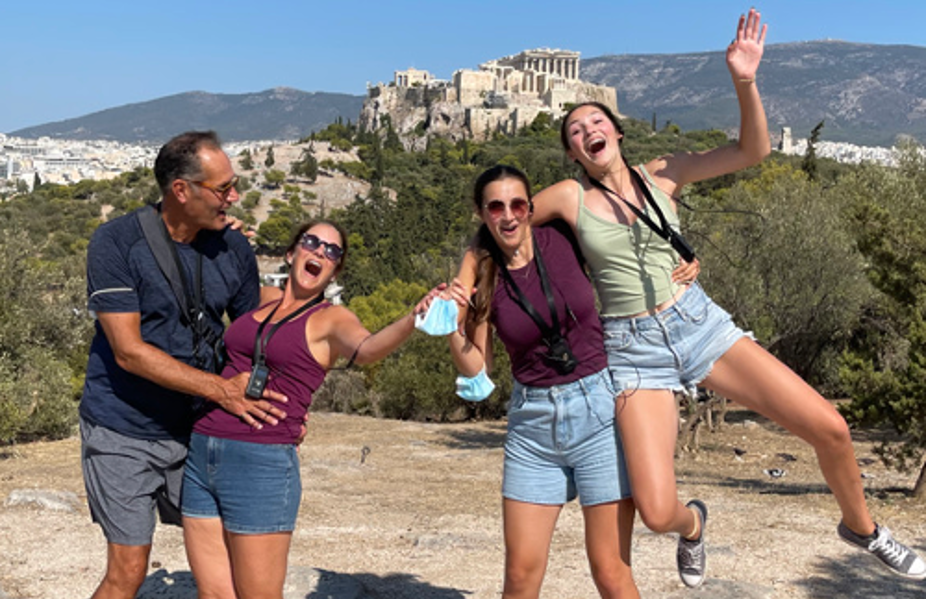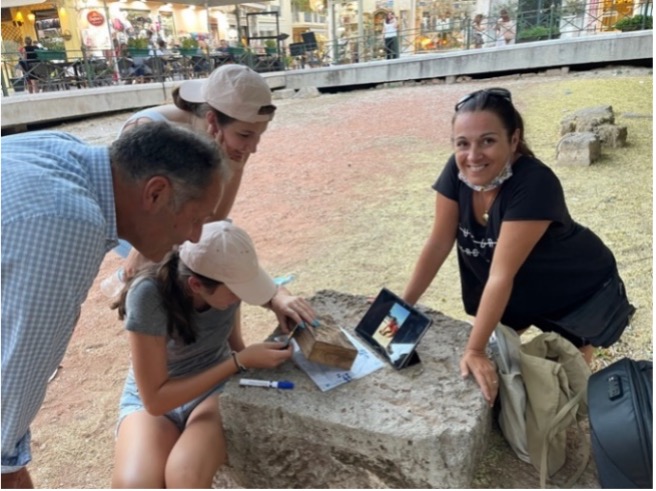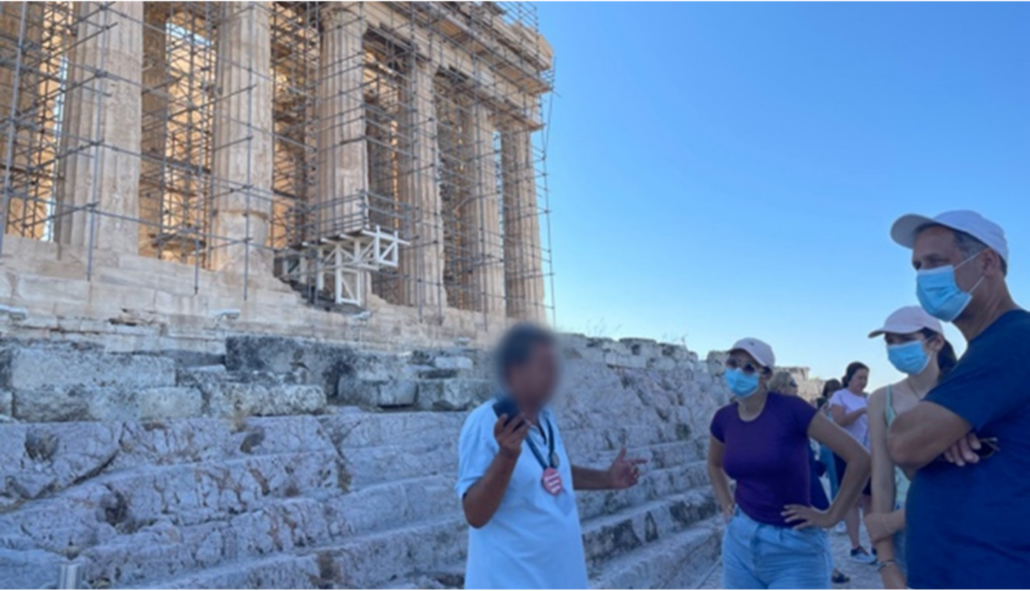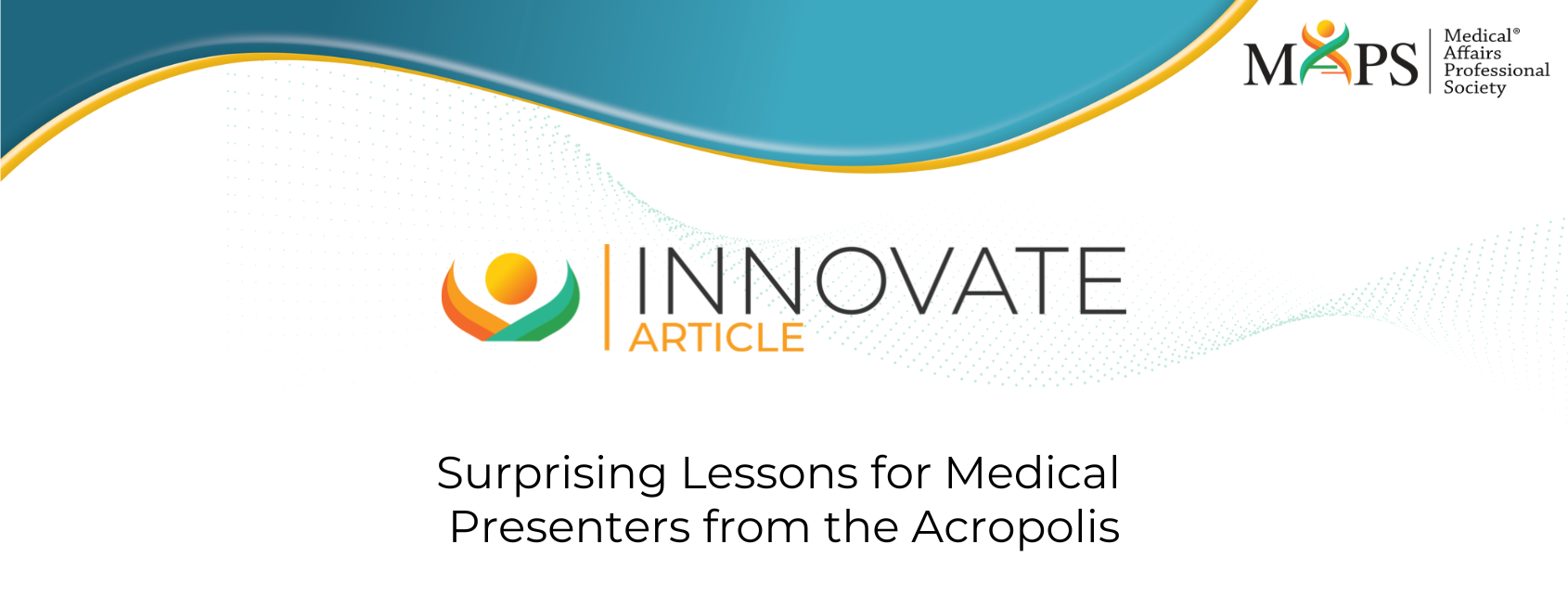
By Jill Donahue, Author/Speaker, Excellerate
“She was wonderful!” said my 17-year-old daughter.
“We learned so much and it was so fun!” agreed my 14-year-old.
We had just said goodbye to our tour guide, Charis, after a three-hour walking tour around the outskirts of the Acropolis in Athens. If you have teenagers, you know that accolades like that do not come easily—especially after a history lesson in extreme heat! We were at the end of our two-week vacation in Greece, and this was the first tour that they had actually enjoyed.
Frankly, I felt the same way.
Over a much-needed dinner in the bustling Plaka neighborhood below the Acropolis we talked about our tour, what we learned and what made her delivery so much better than the rest.
“Why did you like it so much?” I asked them. “What did she do right?”
We noticed that since we were all so engaged, we didn’t even realize how much we were learning about Greek mythology and the history of democracy. In a seemingly effortless manner, she incorporated many of the techniques I teach to medical presenters. Behind her natural delivery were brilliant strategies at work. We decided that her success rested on a solid foundation and three pillars.
They happen to be the same strategies that can and should be used by medical presenters too. After all, don’t we all want our audiences to leave saying they learned so much?
First off, Charis drew on an amazing foundation of expert knowledge. I bet you already have that foundation. You know your science! However, most medical presenters stop there, thinking it’s enough to know their topic inside and out. I encourage you to think of that as merely the foundation. It’s the three pillars our guide added that made all the difference. Once you incorporate these pillars, you too will see enthusiastic reactions from your audience.
Here are the three pillars that Charis built over top of her foundation of expert knowledge:
-

Charis—our new favorite teacher—engaged us with a series of challenges to unlock the treasure.
She connected new information to old
She got to know us, and what we knew about the topic. Early in the tour, she asked our girls if they knew anything about the Greek gods. In fact, both girls are practically experts on the subject, as they’ve read the entire Percy Jackson book series based around Greek myths. Charis was so excited about that. Even though she had lots of wisdom to share, she held back and delighted in pulling the answers out of the girls. Then she built on what they knew.
How do you learn about your audience? How can you build on what they already know and connect new information to old if you don’t learn about them first? Ideally, you should learn about your audience before you get in front of them—perhaps through a formal or very informal needs assessment. Simply asking an audience member a few key questions ahead of time is a great place to start.
- She practiced the Socratic Method
Question: how do you think she managed to engage us? I just gave you a hint…. She asked us questions!
And not only that, she was creative! She set up an “escape room” in a knapsack. Our job was to find the missing professor by solving riddles, puzzles, and challenges. It was so engaging that we didn’t even realize we were learning.
You’ve likely heard of the Socratic method before but how does it relate to your medical presentations? As you know, Socrates is thought to be the greatest Ancient Greek philosopher. In his mission to improve society, he believed that he couldn’t change minds by “telling” but rather by asking. The Socratic Method is sometimes called the “midwifery method” because it uses dialogue and reason to “give birth” to new ideas that you already have inside you.
Seeking to uncover political and ethical truths, Socrates would start by saying, “I am ignorant, please help me understand.” In so doing, he challenged people’s beliefs, and fostered the development of new ideas to shape a better society.
But what does it mean to you and how you present? Simply put, don’t tell, ask! The best teachers hold back the answers and let the audience come to them. Your job is to make your audience think. If their mind isn’t moving, they won’t be moved.
- She cared
Charis made us feel, well…liked! How did she do that? She was encouraging. She made us feel smart. She was enthusiastic. It seemed like she was truly enjoying the tour.
“This is fun for me!” she said.
The result? We felt like she was our confidant—our “go to girl” for Athens. She was someone we could call on if we got in trouble. We even stayed in touch beyond the trip and have connected her with friends who plan to travel to Athens. (If you ever visit Athens, be sure to reach out to Charis Kavvada at theacropolistreasurehunt.com)
Isn’t that what we all want? We hope to become the “go to” person in our area of expertise. However, as Charis demonstrated, people don’t care how much you know until they know how much you care! Learn about your audience, what they care about, what their challenges are. Be enthusiastic about how you can help them to help patients. Show that enthusiasm. A great way to show how much you care? Start with your ‘why!’

Look at our body language. We were so disengaged; we were almost angry!
The next day, with great anticipation, we went inside the gates of the Acropolis and hired a “licensed guide” with a Master’s degree in the History of Western Civilization. I should have known better. He didn’t stop talking with fact after fact. Wow, did he know his stuff! But do you think I remember one of those facts? In contrast, I still remember lessons from Charis.
Not once did he ask us a question—or even seem to care what we already knew and what we wanted to learn. We had a ton of questions, but he wouldn’t pause for a second to listen. He was on his own agenda. He had a script to get through, and no way was he going to deviate from that script.
I couldn’t help but compare his approach to Charis’s. She took her time delivering information, stopping frequently to ask questions and check in to ensure we understood and connected with the material. Charis told me later that rather than just “getting through” her script, she is driven by a desire to connect with people and ensure they get the most out of the experience.
“I am never in a hurry to finish, never tired, and always willing to go the extra mile,” she told me.
The licensed Acropolis guide, on the other hand, seemed to care only about delivering his script. Frankly, we should have saved our money and simply read about the Acropolis on the internet.
So—back to you. Ask yourself, could your audience learn your presentation by reading it themselves? If so, you’re not doing your job. How much more enjoyable would it be for both you and your audience if you learned about them so you could connect new information to old? What would happen if you taught like Socrates and made them think? How would things be different if you connected with and shared your ‘why’ to show them you care?
We don’t need a Greek myth to answer that riddle. If you incorporate these three pillars for better communication, not only will you love your job more, but you will also be better at it! The best part? When you communicate well in your role, you’re helping others help more patients. I can’t think of a better reason to become a stronger presenter.
The Innovate article series highlights the ideas of Medical Affairs thought leaders from across the biopharmaceutical and MedTech industries. To submit your article for consideration, please contact MAPS Communications Director, Garth Sundem.



